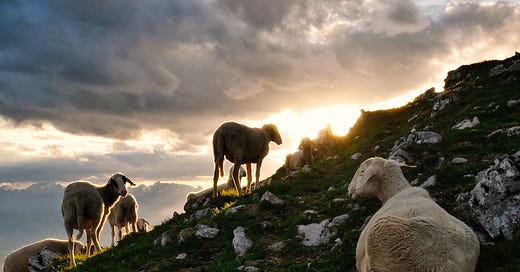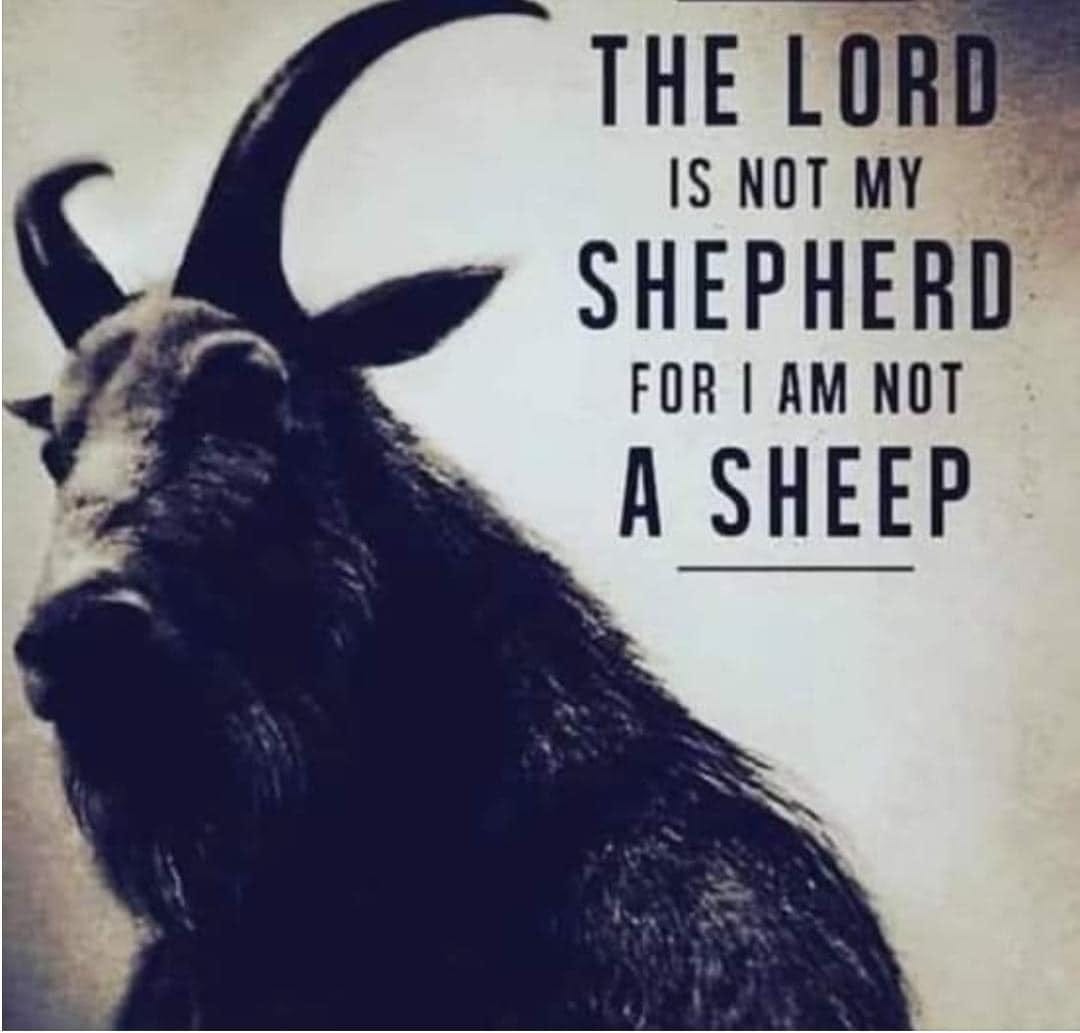My wife wasn’t raised in the Church, and so when we first got married, she wasn’t familiar with a lot of the Bible. At one point, she asked me, “Why are there so many stories about sheep and goats?”
I said, “What are you talking about? It’s not all sheep and goats.” And, of course, the very next Sunday was today’s Gospel reading.1
Walked right into that one.
Reading 1
Lv 19:1-2, 11-18
The LORD said to Moses, "Speak to the whole assembly of the children of Israel and tell them: Be holy, for I, the LORD, your God, am holy.
"You shall not steal. You shall not lie or speak falsely to one another. You shall not swear falsely by my name, thus profaning the name of your God. I am the LORD.
"You shall not defraud or rob your neighbor. You shall not withhold overnight the wages of your day laborer. You shall not curse the deaf, or put a stumbling block in front of the blind, but you shall fear your God. I am the LORD.
You shall not act dishonestly in rendering judgment. Show neither partiality to the weak nor deference to the mighty, but judge your fellow men justly. You shall not go about spreading slander among your kin; nor shall you stand by idly when your neighbor's life is at stake. I am the LORD.
"You shall not bear hatred for your brother in your heart. Though you may have to reprove him, do not incur sin because of him. Take no revenge and cherish no grudge against your fellow countrymen. You shall love your neighbor as yourself. I am the LORD."
There are 613 laws in the Torah, including a couple of different variations on what we call “The” Ten Commandments, in Exodus and Deuteronomy.2 The set of laws in today's reading is deliberately designed to mimic the wording of those.
Most of them are pretty straightforward and understandable, but there is one that modern audiences, especially Christians, might find curious: “Show neither partiality to the weak nor deference to the mighty.” Shouldn’t we help the weak? In fact, isn’t that what today’s Gospel is about?
Yes and no. Jesus, as we’ll see, is talking about personal conduct. But Leviticus is talking about the law.
Yes, we should have sympathy for the weak, the needy, the downtrodden. But humans are necessarily operating with limited knowledge. Everyone is oppressed and downtrodden in one way or another, and it’s not always clear who is more oppressed, especially in ways that are relevant to the dispute at hand.
Furthermore, once courts start taking into account degrees of weakness or mightiness, you’ll give perverse incentives for people to pretend to be weak in some manner. Because of our imperfections and limited knowledge, we have to apply the law impartially.
But that’s not what Jesus is talking about in the Gospel.
Responsorial Psalm
Ps 19:8, 9, 10, 15
R. Your words, Lord, are Spirit and life.
The law of the LORD is perfect,
refreshing the soul.
The decree of the LORD is trustworthy,
giving wisdom to the simple.
R. Your words, Lord, are Spirit and life.
The precepts of the LORD are right,
rejoicing the heart.
The command of the LORD is clear,
enlightening the eye.
R. Your words, Lord, are Spirit and life.
The fear of the LORD is pure,
enduring forever;
The ordinances of the LORD are true,
all of them just.
R. Your words, Lord, are Spirit and life.
Let the words of my mouth and the thought of my heart
find favor before you,
O LORD, my rock and my redeemer.
R. Your words, Lord, are Spirit and life.
God wrote down His laws in the Torah to help us remember what we ought to do. But it’s also true that He wrote His law on our hearts. Deep down, if you reflect on what you’re doing, you’ll know if it’s right or wrong.
That’s what this time of Lent is for.
Verse Before the Gospel
2 Cor 6:2b
Behold, now is a very acceptable time;
behold, now is the day of salvation.
Don’t wait, act now!
Gospel
Mt 25:31-46
Jesus said to his disciples: "When the Son of Man comes in his glory, and all the angels with him, he will sit upon his glorious throne, and all the nations will be assembled before him. And he will separate them one from another, as a shepherd separates the sheep from the goats. He will place the sheep on his right and the goats on his left. Then the king will say to those on his right, 'Come, you who are blessed by my Father. Inherit the kingdom prepared for you from the foundation of the world. For I was hungry and you gave me food, I was thirsty and you gave me drink, a stranger and you welcomed me, naked and you clothed me, ill and you cared for me, in prison and you visited me.'
Then the righteous will answer him and say, 'Lord, when did we see you hungry and feed you, or thirsty and give you drink? When did we see you a stranger and welcome you, or naked and clothe you? When did we see you ill or in prison, and visit you?'
And the king will say to them in reply, 'Amen, I say to you, whatever you did for one of these least brothers of mine, you did for me.' Then he will say to those on his left, 'Depart from me, you accursed, into the eternal fire prepared for the Devil and his angels. For I was hungry and you gave me no food, I was thirsty and you gave me no drink, a stranger and you gave me no welcome, naked and you gave me no clothing, ill and in prison, and you did not care for me.'
Then they will answer and say, 'Lord, when did we see you hungry or thirsty or a stranger or naked or ill or in prison, and not minister to your needs?' He will answer them, 'Amen, I say to you, what you did not do for one of these least ones, you did not do for me.' And these will go off to eternal punishment, but the righteous to eternal life."
The difference between what Jesus is saying here and what God says in the Torah is that Jesus is talking about individual action. Just as there can’t be collective guilt, there can’t be collective merit.
He doesn’t say, “When I was cold, you paid your taxes into the general fund, in the hopes that politicians, who are known to be trustworthy and altruistic, would distribute some of that money (after, of course, funding wars and other policies that lead directly to cold, hungry, imprisonment, etc we’re concerned about) to some organizations based on their effectiveness and not political agreements with said politician, who then, after deducting costs for overhead and fundraising, clothed me.”
Jesus wants us to consciously direct our efforts to feeding the hungry, freeing the prisoners, etc. Now, you may not always be able to personally help someone in need, but that doesn’t mean you’re going to be lumped in with the goats just because you don’t know anyone who’s in prison. You can still donate directly to charities and causes that you know will actually help people.
Some people set money aside in a special “vacation account.” There’s no actual reason to do this; money is fungible. You can just wait until you’ve saved the planned amount and withdraw it from your regular checking account. But there’s something psychological about having a separate bank account.
You can do the same thing, with your spiritual account in heaven. St. Josemaría talked about sanctifying our work, no matter what you do for a living. Don’t just donate a fixed amount of money at the end of the month or year.
If you plan on donating $X, figure out how many hours that is, or the number of sales it would take. Say a little prayer at the office, that you’re going to consecrate your time on the Jones account to the sick that the Red Cross ministers to; or you’ll spend the next 6 hours in the factory devoted to the homeless shelter downtown. Depending on your job, you might actually do more good earning a little extra money working overtime so you can buy supplies for the soup kitchen, than spending those same hours ladling soup out for the hungry.
Going back to what I saw saying regarding the first reading, this is individual action, not collective. I don’t know your situation, and how you can best minister to the sick or offer drink to the thirsty. But you do, and so does God.
At least, I think it was. There really are a lot of references to sheep and goats. Remember this edgy atheist meme from a few weeks ago?






